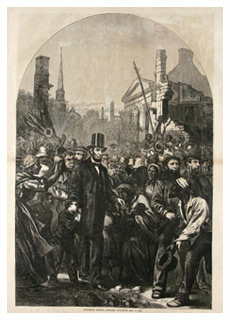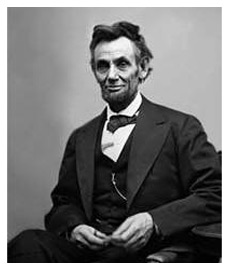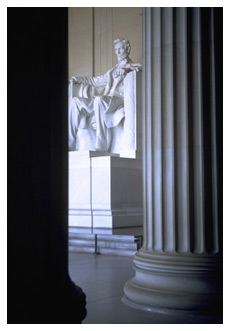
President Lincoln entering Richmond, VA on April 4, 1865

The last portrait of President Lincoln

The Lincoln Monument, Washington D.C.

Our purpose during the commemoration of the Lincoln Bicentennial is threefold. First, we will highlight the commonality between Dr. King and Abraham Lincoln. Both of these great men became enmeshed in the struggle for racial equality and the unification and healing of our nation. Lincoln reminded us that we were not North and South, but one nation. King reminded us we were more than Black and white, but one people.
Second, we will educate the public about Lincoln's deep Virginia roots. His great-grandparents, grandparents, and parents lived in Virginia; his parents met, married, and lived for a time in the Shenandoah Valley; his great-grandparents and multiple relatives are buried in Virginia in the Lincoln Cemetery at the Lincoln Family Homestead in Rockingham County. There are Lincoln descendants living in the Shenandoah Valley today. During the Civil War, Lincoln's family in Virginia were slave owners and Confederates, and he visited several Virginia localities, including Petersburg and Richmond, the Confederate capital, in April 1865, just a few days prior to his death. Abraham Lincoln is a central figure in American history, and he is inextricably and forever a part of the social fabric of the Commonwealth. Lincoln desired "not only to save his country, but also to make it worthy of the saving, a place where all would have the right to rise."
Last, we are initiating and supporting endeavors that appropriately consider the historical and social context of the Lincoln presidency, and that illuminate his sacrifices and fervent determination to preserve the experiment in democracy birthed in the union of states called the United States of America. Lincoln guided the country through the most devastating experience in our national history. Regardless of our sensibilities and loyalties towards Abraham Lincoln, we, too, can "resolve that the brave men of the Union and the Confederacy shall not have died in vain, that this nation, under God, shall have a new birth of freedom and that government of the people, by the people, for the people, shall not perish from the earth." These principles resonate with all of us and endure as a core part of the American value system. Therefore, it is both "fitting and proper" to remember and celebrate the Bicentennial of Abraham Lincoln, 16th President of the United States, whose leadership during a dark and difficult time reminds us today that we are "one nation under God, indivisible, with liberty and justice for all."
During the 2012 Session of the General Assembly, the Dr. Martin Luther King, Jr. Memorial Commission was directed to incorporate the objectives of House Bill 527, (Delegate McQuinn), into its work. House Bill 527 would address the contemporary political, economic, educational, and societal issues and public policies whose roots lie in the transatlantic slave trade. Other issues would involve (i) identifying the vestiges and assessing the effects of the transatlantic slave trade on African Americans, the Commonwealth, and modern societal problems and public policies, (ii) exploring and showcasing the contributions of African Americans in building Virginia and the nation, (iii) determining the educational and economic value to the Commonwealth of preserving sites and facilities of historic and archaeological significance to African American culture and contributions, and (iv) recommending feasible and appropriate options to resolve lingering societal problems whose roots lie in slavery.